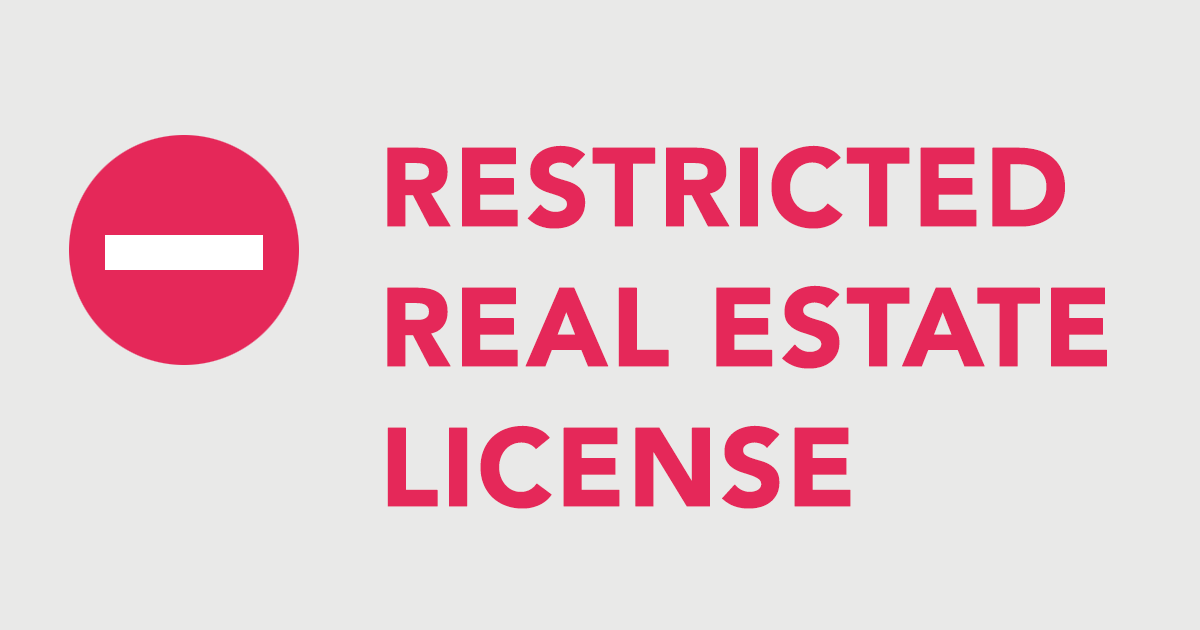
If you are interested in becoming a real estate agent, you will need to get a Kentucky real estate license. It is easy and straightforward. There are some requirements that you must meet. A background check will be required in order to obtain insurance against Errors or Omissions (E&O).
The pre-license education course is necessary before you can start your career in real estate. The coursework involves a background check, fingerprinting and a prelicensing exam. Choosing a real estate school that is accredited is critical. The school can determine the cost of your coursework. It can cost anywhere from $300 to $500. You can also use academic credit from accredited colleges to reduce the number of hours required.
After you have completed the pre-licensure education, you are eligible to apply for the real estate exam. Kentucky Real Estate Commission (KREC), will review your application and decide if you're eligible to sit for the exam. Two IDs are required to pass the exam. One ID must be issued by government and the second must contain your legal name as well as signature.

After you submit your application you will receive an email notification from the Kentucky Real Estate Commission. Make sure you carefully read the email.
KREC will issue you a score report with a list containing items required. Within 36 to 48 hours, the report will reach you.
Once you have obtained your passing score you will need to apply in order to obtain a real property license. The license allows you sell or lease property in Kentucky. It is mandatory to renew your license. Additionally, you will need to continue education. These courses are called Core Courses, and you must complete at least six credits annually. It is crucial to hire a qualified trainer in the early years of your career. A good trainer will ensure that you follow a systematic and repeatable process.
Once you have completed your training, you will need to pass the real estate licensing exam. Kentucky offers a 240-minute exam, with 130 questions. Candidates should plan to spend at most three to four month completing their training as well as the exams.

A state-issued E&O Insurance policy will be required in addition to your real estate license. There are many private insurance carriers that provide E&O coverage. Also, you can be part of a group E&O plan.
You will need to take the exam at a PSI testing center. You can also apply online for the exam. The fee for both the application and the exam is generally $130. Once you have provided all required documentation, your application will be processed.
The Kentucky Real Estate Commission will review each application on a individual basis. Failure to meet one of the required components will result in you having to retake the entire test. Retakes will result in a $100 charge.
FAQ
How much money do I need to purchase my home?
The number of days your home has been on market and its condition can have an impact on how much it sells. The average selling price for a home in the US is $203,000, according to Zillow.com. This
What is a reverse loan?
A reverse mortgage is a way to borrow money from your home without having to put any equity into the property. It allows you access to your home equity and allow you to live there while drawing down money. There are two types available: FHA (government-insured) and conventional. A conventional reverse mortgage requires that you repay the entire amount borrowed, plus an origination fee. If you choose FHA insurance, the repayment is covered by the federal government.
How do you calculate your interest rate?
Market conditions can affect how interest rates change each day. The average interest rates for the last week were 4.39%. Add the number of years that you plan to finance to get your interest rates. For example, if you finance $200,000 over 20 years at 5% per year, your interest rate is 0.05 x 20 1%, which equals ten basis points.
Which is better, to rent or buy?
Renting is generally cheaper than buying a home. But, it's important to understand that you'll have to pay for additional expenses like utilities, repairs, and maintenance. A home purchase has many advantages. For example, you have more control over how your life is run.
Can I afford a downpayment to buy a house?
Yes! There are many programs that can help people who don’t have a lot of money to purchase a property. These programs include conventional mortgages, VA loans, USDA loans and government-backed loans (FHA), VA loan, USDA loans, as well as conventional loans. More information is available on our website.
What should I look for in a mortgage broker?
Mortgage brokers help people who may not be eligible for traditional mortgages. They shop around for the best deal and compare rates from various lenders. This service is offered by some brokers at a charge. Others provide free services.
Is it possible fast to sell your house?
You may be able to sell your house quickly if you intend to move out of the current residence in the next few weeks. There are some things to remember before you do this. You must first find a buyer to negotiate a contract. The second step is to prepare your house for selling. Third, it is important to market your property. Finally, you should accept any offers made to your property.
Statistics
- This seems to be a more popular trend as the U.S. Census Bureau reports the homeownership rate was around 65% last year. (fortunebuilders.com)
- Some experts hypothesize that rates will hit five percent by the second half of 2018, but there has been no official confirmation one way or the other. (fortunebuilders.com)
- This means that all of your housing-related expenses each month do not exceed 43% of your monthly income. (fortunebuilders.com)
- Based on your credit scores and other financial details, your lender offers you a 3.5% interest rate on loan. (investopedia.com)
- 10 years ago, homeownership was nearly 70%. (fortunebuilders.com)
External Links
How To
How to Manage a Rental Property
It can be a great way for you to make extra income, but there are many things to consider before you rent your house. We'll help you understand what to look for when renting out your home.
Here are some things you should know if you're thinking of renting your house.
-
What should I consider first? You need to assess your finances before renting out your home. If you have debts, such as credit card bills or mortgage payments, you may not be able to afford to pay someone else to live in your home while you're away. You should also check your budget - if you don't have enough money to cover your monthly expenses (rent, utilities, insurance, etc. It may not be worth it.
-
How much does it cost for me to rent my house? Many factors go into calculating the amount you could charge for letting your home. These factors include your location, the size of your home, its condition, and the season. You should remember that prices are subject to change depending on where they live. Therefore, you won't get the same rate for every place. The average market price for renting a one-bedroom flat in London is PS1,400 per month, according to Rightmove. If you were to rent your entire house, this would mean that you would earn approximately PS2,800 per year. This is a good amount, but you might make significantly less if you let only a portion of your home.
-
Is it worth it? There are always risks when you do something new. However, it can bring in additional income. Be sure to fully understand what you are signing before you sign anything. It's not enough to be able to spend more time with your loved ones. You'll need to manage maintenance costs, repair and clean up the house. Before signing up, be sure to carefully consider these factors.
-
Is there any benefit? There are benefits to renting your home. There are plenty of reasons to rent out your home: you could use the money to pay off debt, invest in a holiday, save for a rainy day, or simply enjoy having a break from your everyday life. It's more fun than working every day, regardless of what you choose. And if you plan ahead, you could even turn to rent into a full-time job.
-
How can I find tenants? Once you decide that you want to rent out your property, it is important to properly market it. Start by listing online using websites like Zoopla and Rightmove. After potential tenants have contacted you, arrange an interview. This will help you assess their suitability and ensure they're financially stable enough to move into your home.
-
How can I make sure I'm covered? If you don't want to leave your home empty, make sure that you have insurance against fire, theft and damage. You will need insurance for your home. This can be done through your landlord directly or with an agent. Your landlord will typically require you to add them in as additional insured. This covers damages to your property that occur while you aren't there. However, this doesn't apply if you're living abroad or if your landlord isn't registered with UK insurers. In such cases you will need a registration with an international insurance.
-
If you work outside of your home, it might seem like you don't have enough money to spend hours looking for tenants. But it's crucial that you put your best foot forward when advertising your property. A professional-looking website is essential. You can also post ads online in local newspapers or magazines. A complete application form will be required and references must be provided. While some prefer to do all the work themselves, others hire professionals who can handle most of it. Interviews will require you to be prepared for any questions.
-
What should I do once I've found my tenant? You will need to notify your tenant about any changes you make, such as changing moving dates, if you have a lease. If this is not possible, you may negotiate the length of your stay, deposit, as well as other details. You should remember that although you may be paid after the tenancy ends, you still need money for utilities.
-
How do you collect rent? You will need to verify that your tenant has actually paid the rent when it comes time to collect it. If your tenant has not paid, you will need to remind them. After sending them a final statement, you can deduct any outstanding rent payments. You can call the police if you are having trouble getting hold of your tenant. They won't normally evict someone unless there's been a breach of contract, but they can issue a warrant if necessary.
-
How do I avoid problems? While renting out your home can be lucrative, it's important to keep yourself safe. Consider installing security cameras and smoke alarms. It is important to check that your neighbors allow you leave your property unlocked at nights and that you have sufficient insurance. You should never allow strangers into your home, no matter how they claim to be moving in.